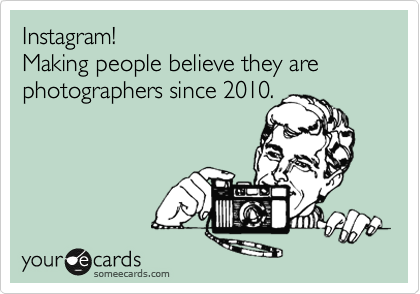Old Print Journalists Embrace the New Media
...We Kind of Need your Help
 |
| IAMAPHOTOGRAPHER! |
The Internet - thanks in part to Tim Berners-Lee - has connected everyone on the globe and through social media and mass amateurization we've woven together a system to do just that.
Facebook, Twitter, Instagram, and the other platforms that we've created have changed the landscape in which we speak to one another. In Everyone is a Media Outlet, Clay Shirky tells the story of his uncle a small-town newspaperman that published to a population of about 5,000 people. At the time syndicated newspapers were on the rise and his competition was the USA Today. He called them, "TV on paper," which I found interesting, accurate and ahead of his time.
| In a world where TV and paper are the same thing, paper cuts take on a whole new meaning. |
It was like TV on paper, in that it had a national audience and was colored. "The Richmond Daily News and USA Today were in the same business; even with the difference in scale and scope..." (Shirky 55). Just like today newspaper, television and radio are all in similar businesses that being the bottom line, entertainment. However, now the scope for those three mediums and the Internet are global. Something that Shirky's uncle may have never thought in the realm of possibility.
Celebrities using Twitter touch not only their origin country but the entire globe and with mass amateurization even your own Twitter feed has the possibility to go global.
"It used to be hard to move words, images, and sounds from creator to consumer, and most media businesses involve expensive and complex management of that pipeline problem, whether running a printing press or a record label." (Shirky 59)
But that brings up the validity of mass amateurization. The Richmond Daily News and the USA Today have something in common, professional composure. You can question the validity from their publications but they have a staff of writers and editors that are checking and double checking the information that they print, they're professionals. Mass amateurization has created a commercial enterprise for opinion.
"As a consequence, control over the media is less completely in the hands of the professionals." (Shirky 59) Meaning that mass amateurization opened up new doors, anyone with a smartphone can create content that 30 years ago would have cost thousands of dollars to make and several weeks, if not months.
One of the first non-professionals that created his own content via the Internet and did it in the realm of success was Matt Drudge. Before the advent of the blog Mr. Drudge using email broke stories, one of the most notable was breaking the Monica Lewinsky scandal that the USA Today had killed.
The system he initially got started using was email. He'd write his opinion about trending political topics and then send it out to his friends. Before he knew it the email group was reaching into the thousands and that's when he created his blog called the Drudge Report. This was audience participation in an extreme sense.
"Media producers and advertisers now speak about 'emotional capital' or 'lovemarks' to refer to the importance of audience investment and participation in media content." (Jenkins 175)
Social media has opened doors to fans to create their own content or participate in conversations about content media producers have already created with television shows.
| How awesome was that first episode, anyone? #terminus #nospoilers |
These conversations are on a global scale and that causes parents, groups, communities and corporations to take a step back and reconfigure as to what this means for their viewers and their kids. "Corporations imagine participation as something they can start and stop, channel and reroute, commodify and market." (Jenkins 175) But it's not only corporations it's also religions and government. Mass publication opened Pandora's box into our evolution.
We're cautionary in that we don't want to fall to far down the rabbit hole and not be able to come back out. I think Jenkins puts it well at the end of Why Heather Can Write, "Rather, we should see it as increasingly a space where children teach one another and where, if they would open their eyes, adults could learn a great deal." (216)
The old have trouble letting in the new and I think for the future of the media professional it is a necessity that we open our minds to the internet and the realm of online collaboration between the old publishers and the new.
In Shirky's words, "The spread of literacy after the invention of movable type ensured not the success of the scribal profession but its end. Instead of mass professionalization, the spread of literacy was a process of mass amateurization...this is what is happening today, not just to newspapers or to media in general but to the global society." (80)
Matthew Cole
Convergence
Professor Caçoilo
15 Oct 2014
Bibliography:
Shirky, Clay. "Everyone is a Media Outlet." Here Comes Everybody: The Power of Organizing Without Organizations. 24 Feb 2009.
Jenkins, Henry. "Why Heather Can Write." Convergence Culture: Where Old and New Media Collide. 2006.
Weiss, Philip. "Watching Matt Drudge." New York. 24 Aug 2007. 15 Oct 2014. <http://nymag.com/news/media/36617/>
No comments:
Post a Comment